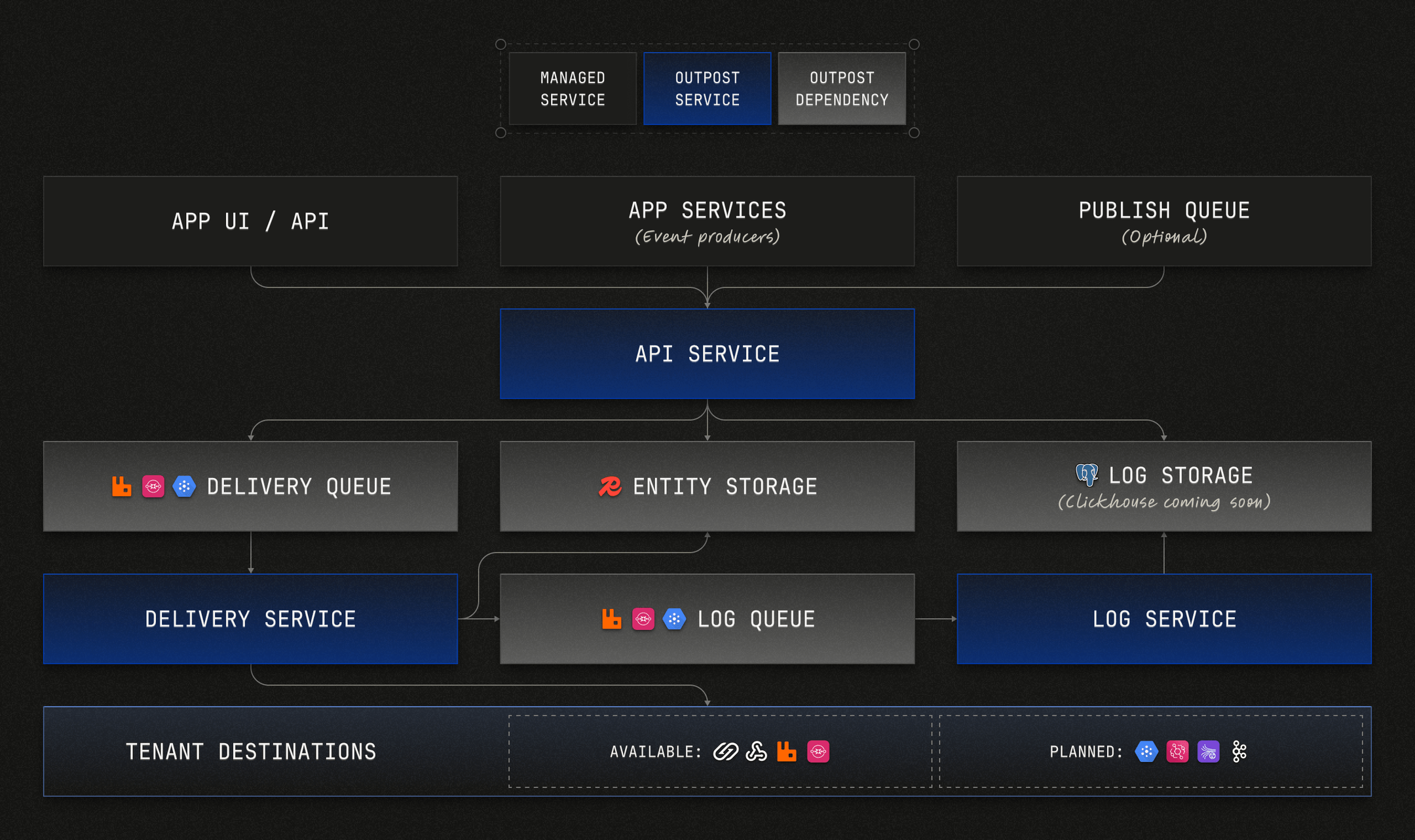Introducing Outpost: Open Source Outbound Webhooks and Event Destinations Infrastructure
Today, we're excited to announce the first release of Outpost — self-hostable, open-source outbound webhooks and event destinations infrastructure.
Outpost is built for SaaS and API platforms that need to push events to customer-defined destinations — including webhook endpoints, message queues, and event buses — and want full observability, retry logic, and great DX out of the box.

Why We Built Outpost
Most SaaS and API platforms eventually need to notify their users when something happens — a payment is made, a message is sent, a record is created or updated, a workflow advances, or a process completes. The go-to solution is usually to build an outbound webhooks system. But over time, as your product scales and customer needs grow more sophisticated, this seemingly simple system becomes harder to maintain.
Building and maintaining outbound webhook infrastructure involves tackling core engineering challenges. Scaling effectively means designing systems that can absorb traffic spikes without dropping events, as message loss directly impacts downstream consumers. Reliability requires implementing robust mechanisms like exponential backoff retries, DLQs or similar functionality, to ensure eventual delivery, even when destination endpoints are temporarily unavailable.
Developers consuming your webhooks also need observability and debugging tools such as detailed logs, delivery statuses, and payload inspection, to diagnose issues without resorting to support tickets.
The webhook and event delivery ecosystem is evolving, largely driven by leading platforms like Stripe, Shopify, and Twilio. By expanding support beyond traditional HTTP endpoints towards the broader concept of Event Destinations — including direct routing to message queues (SQS, Kafka) and event buses (EventBridge) — they are shaping a wider industry trend towards more integrated event-driven architectures and influencing developer expectations. Managing this growing destination heterogeneity, along with multi-tenancy and sophisticated routing logic, adds considerable complexity to the overall engineering task.
We built Outpost to address these challenges head-on. It gives platforms a scalable, reliable way to deliver events to their users' infrastructure — without needing to build that capability from scratch.
What is Outpost?
Outpost provides a set of services to configure, manage, publish, and reliably deliver platform events to user-defined event destinations — webhooks, queues, and event buses — with at-least-once delivery guarantees and full observability. It gives you full control over infrastructure, cost, and compliance — all while shipping a reliable event delivery experience to your users.
It's self-hostable, open source under the Apache 2.0 license, and compatible with your existing event models. Whether you emit events from a database change, background job, or internal service, Outpost can take it from there.
Outpost is built using Go. The documentation is powered by Zudoku, the open source documentation framework. Additionally, the SDKs and MCP server are generated using Speakeasy, making Outpost integration even simpler.
Key Features
- Reliable Outbound Webhooks: Deliver events to HTTP webhooks with built-in retries and exponential backoff.
- Best Practice Webhooks: Includes idempotency headers, timestamping, signature validation, and rotation.
- Beyond Webhooks: Extend delivery to Hookdeck, AWS SQS, RabbitMQ, Amazon Kinesis, and more.
- At-Least-Once Delivery: Ensures events are delivered reliably.
- Multi-Tenant Support: Route events per customer, workspace, or organization using auth headers or API keys.
- API: REST API for publishing events, managing destinations, and configuring settings.
- SDKs: SDKs for Go, TypeScript, and Python to simplify integration.
- Developer Portal: Your users can view delivery logs, manage endpoints, rotate credentials, and replay events.
- Topic-Based Subscriptions: Use publish-subscribe patterns to let users select which events they care about.
- OpenTelemetry Integration: Native support for standardized tracing, metrics, and logs.
- Delivery Failure Handling: On failure, notifications are triggered and destination can be automatically disabled.
How It Works
Outpost acts as an event relay between your backend and your users' infrastructure.
- Your system publishes an event, either via a direct API call or configured publish message queue.
- Outpost ingests the event and resolves which destinations should receive it (based on topics and tenant-specific configurations).
- Securely delivers the event to each destination — webhooks, queues, or event buses.
- Delivery status is tracked, retries are and failures automatically managed, and users can observe and replay events via the portal.
This lets you give your users flexible and reliable event delivery — without having to build all the infrastructure yourself.
Built for Developer Platforms
We built Outpost to help developer platforms scale their event delivery without taking on the operational overhead of maintaining custom webhook systems.
You can integrate it as a sidecar, microservice, or shared infrastructure component — and it's designed to grow with you from day one to multi-tenant scale.
This enhances the developer experience for your platform's users, providing them with essential visibility and control over event delivery.
Try It Out
Outpost is available now and open for feedback, contributions, and collaboration.
- 🧑💻 GitHub: https://github.com/hookdeck/outpost
- 📚 Docs: https://outpost.hookdeck.com/docs
- 🌐 Website: https://outpost.hookdeck.com/
You can deploy Outpost locally or to any cloud provider as a standalone binary, via Docker or Kubernetes.
What's Next
We're just getting started and have a lot planned:
- Support License Offering: We're introducing a support license for teams that need dedicated assistance, including priority support, deployment guidance, and integration help. Get in touch for more information.
- More event destination types including GCP Pub/Sub, Amazon EventBridge, and Kafka.
- ClickHouse log storage for highly scalable observability and analytics.
- Helm chart release for easy deployment to Kubernetes.
- Improved documentation covering deployment, configuration, and best practices.
If you're building a developer platform or API and want to give your users robust, reliable event delivery — without reinventing the wheel — we'd love for you to try Outpost and share your thoughts.